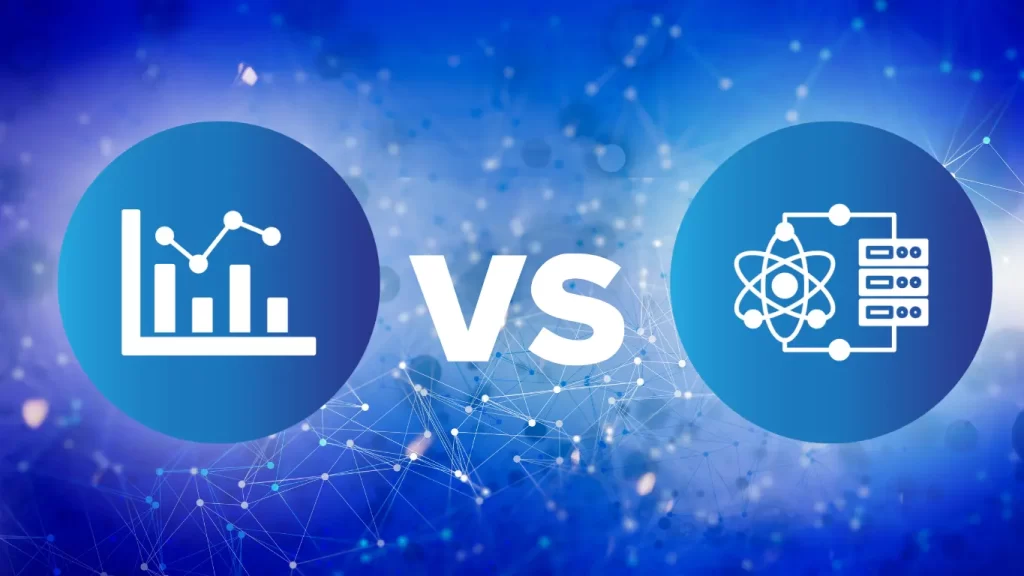Data Analytics vs. Data Science: The Difference

In the realm of modern business, the terms “data analytics” and “data science” are often used interchangeably, leading to confusion about their respective roles and contributions. While both fields revolve around extracting insights from data to inform decision-making, they encompass distinct methodologies, skill sets, and objectives. Understanding the differences between the two is crucial for organizations aiming to leverage data effectively. Let’s break down these two disciplines to shed light on their unique characteristics and applications.
Data Analytics: Unveiling Patterns and Trends
Data analytics primarily focuses on uncovering meaningful patterns and trends within existing datasets to facilitate informed decision-making. It involves the exploration, cleansing, and visualization of data to derive actionable insights. Data analysts utilize various statistical techniques and software tools to analyze historical data and identify correlations, outliers, and patterns.
One of the key objectives of data analytics is to answer specific business questions and optimize processes. For example, retail companies may employ data analytics to understand customer purchasing behavior and optimize inventory management strategies accordingly. Similarly, healthcare organizations may utilize analytics to identify factors influencing patient outcomes and improve treatment protocols.
Data analytics often involves descriptive and diagnostic analysis, aiming to explain what happened and why it occurred. It provides valuable insights into past performance and enables organizations to make data-driven decisions in real-time. Common techniques used in data analytics include regression analysis, clustering, and data visualization.
Data Science: Predictive Insights and Prescriptive Solutions
Data science encompasses a broader spectrum of techniques and methodologies aimed at extracting insights, building predictive models, and designing data-driven solutions. Unlike data analytics, which focuses on historical data, data science incorporates predictive and prescriptive analytics to anticipate future trends and prescribe optimal actions.
Data scientists possess a diverse skill set that includes expertise in mathematics, statistics, programming, and domain knowledge. They employ advanced algorithms and machine learning techniques to analyze large volumes of structured and unstructured data, uncover hidden patterns, and develop predictive models.
One of the distinguishing features of data science is its emphasis on predictive modeling and forecasting. By leveraging historical data, data scientists can build models capable of predicting future outcomes with a high degree of accuracy. These predictive insights enable organizations to anticipate market trends, identify potential risks, and seize opportunities proactively.
Moreover, data science extends beyond analysis to the development of actionable solutions and intelligent systems. Whether it’s building recommendation engines for e-commerce platforms or implementing predictive maintenance algorithms for manufacturing facilities, data science plays a pivotal role in driving innovation and creating tangible business value.
Conclusion
While data analytics and data science share the common goal of extracting insights from data, they differ in terms of scope, methodology, and objectives. Data analytics focuses on uncovering patterns and trends within existing datasets to facilitate descriptive and diagnostic analysis, while data science encompasses predictive modeling, prescriptive analytics, and the development of intelligent solutions.
Both disciplines play integral roles in leveraging data to drive business growth, improve operational efficiency, and enhance decision-making processes. By understanding the distinctions between data analytics and data science, organizations can better harness the power of data to gain a competitive edge in today’s data-driven landscape. Whether it’s optimizing marketing campaigns, improving customer experiences, or streamlining operations, the synergy between data analytics and data science empowers organizations to unlock new opportunities and drive innovation in an increasingly complex and dynamic business environment.
Interested to find out more? Get in touch!
